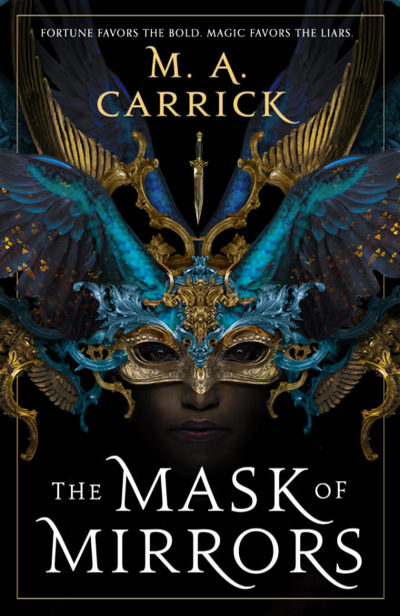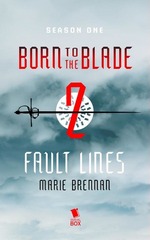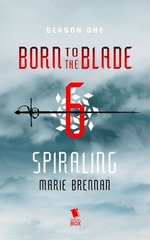In the first part of this Tour Stop, we got quick intro to this novel, now let’s dive in and talk about it.
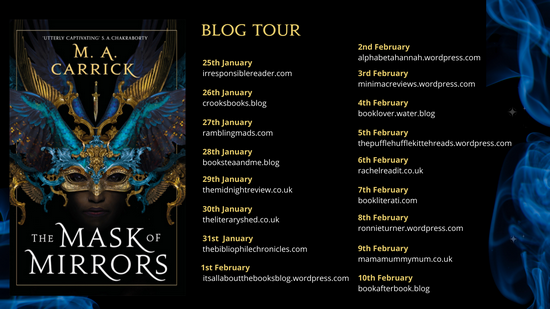
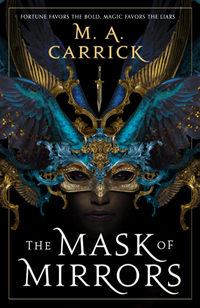 |
The Mask of Mirrorsby M. A. Carrick eARC, 697 pg. Read: January 18-23, 2021 |

What’s The Mask of Mirrors About?
What isn’t it about, really? In The Princess Bride novel, the fictionalized William Goldman recounts how his father introduced the story to him:
“Does it have any sports in it?”
“Fencing. Fighting. Torture. Poison. True love. Hate. Revenge. Giants. Hunters. Bad men. Good men. Beautifulest ladies. Snakes. Spiders. Beasts of all natures and descriptions. Pain. Death. Brave men. Coward men. Strongest men. Chases. Escapes. Lies. Truths. Passion. Miracles.”
That would work as a decent start on a list of what this book is about (except the bit about Giants, maybe they’ll be in the sequel), but just as a start. There’s just no way to say what this book contains briefly. At times it felt like Carrick* took an “everything but the kitchen sink—and all right, we’ll throw that in, too” approach.
* Yes, I know that Carrick actually equals two authors, but there’s one name on the cover and it’s just easier to play along with the conceit for the purposes of this post.
If you find yourself not particularly enjoying a storyline (either at all, or in a particular moment), that’s fine, just wait a couple of pages and you’ll be on to another that will quite possibly be to your liking.
Yeah, often this kind of thing feels unwieldy, clumsy, and hard to follow. But somehow—Carrick pulls it off. It’s a grand-scale novel—focusing on several people, classes, and segments of the city, but feels very contained, very personal, and not all that difficult to take in at once.
I joked while reading this that I didn’t know how I was going to be able to talk about this novel in less than 10,000 words. And I really think it’s true if I wanted to do a complete job. But no one wants me to do that. So I’ll set “complete” aside and go for “almost adequate” instead. The best way to do that is to start our discussion with the initial plotline:
The Long Con
Years ago, Ren and Tess were low-level thieves, working for a Fagin-esque character. The sisters split from that group in a fairly dramatic fashion and left the city of Nadežra. Now, they’re back to make their fortune. Ren poses as Renata Viraudux, an estranged family member of one of the city’s noble families, with Tess at her side as Renata’s maid.
The plan is to endear themselves to the Traementis family and to be officially listed as one of them. She can then plunder their accounts and set the two of them up for a comfortable life. Ren had a good period of time working as the maid of the woman she’s now pretending is her mother, so she knows her, she knows stories about her family—so she’s able to pull off the con pretty well (at least at first).
But there’s a catch..the Traementis family is on the verge of falling apart. Tragedy has whittled the family away to Donaia (the family’s head and the sister-in-law of Letilia, Renata’s supposed mother) and her two children, Leato and Giuna. And the family’s material wealth has been chipped away even more. There’s enough to barely sustain their lifestyle, and Donaia isn’t sure how long she can continue doing that. Some nobility suspects this to be true, but no one other than Donaia knows it—Renata is very ignorant about the status of her targets. Which almost makes her doomed before she begins.
Do note that “almost,” because Ren is as clever and resourceful as you could want for this situation. Once she discovers the family’s situation, she’s not going to let a simple thing like the verge of bankruptcy stop her.
There are times when I almost wanted Ren to get caught—protagonist or not, she has it coming and you will frequently like Leato and Giuna a lot more than her (also, it’d be a lot of fun to see Ren try to get out of it). But overall, you get sucked into her cause and find yourself rooting for her.
In many ways, this story is the heart of the novel. But the more I thought about it as I read—this story is really just an excuse to get Ren involved in everything else going on in Nadežra, and it could practically be eliminated without doing a lot of damage to the book. It is, however, a load-bearing plotline and can’t be removed without doing structural damage (it just feels like it). That may seem like a criticism, but it’s not intended to be one—I find myself oddly drawn to the idea that there’s enough other things of interest and weight going on that you could excise the Primary Plotline and still have a novel worth reading.
The Masked Vigilante
Nadežra, like all good fictional cities, has a masked vigilante running around. The Rook has been a presence for a couple of centuries, defending the helpless, punishing the wicked—particularly if they’re part of the nobility. The Rook is sort of a Batman/Zorro-esque figure, stepping out of the shadows (or on the rooftops). We meet him first as he comes to duel with an arrogant twit over an offense straight out of Cyrano de Bergerac, and who can resist that? He remains a favorite part of the novel for me, dropping in at pivotal moments, but not becoming a focus for long.
Ren quickly becomes fixated on him and in discovering his identity. It is fun watching her try and try to either discover or figure out his identity.
The Quest for Legitimacy
Derossi Vargo, how do I discuss him? Think Lando Calrissian meets Michael Corleone. Vargo has spent years building and building his power base and at the time that Ren comes to the city, he’s at the top of the criminal portion of the city. He’s so powerful now that he’s itching to shed that side of him and embrace being a legitimate businessman. He just needs the chance.
Renata sees this and forms an alliance with him. He aids her in some of her schemes to prop up the Traementis family’s standings and success and she, in turn, will help him with his schemes. Neither fully trusts the other, but they can be of mutual benefit to one another, and that’s enough for them. The relationship builds from this point—but both Ren and Vargo are careful enough with their secrets, their plans, and their ambitions to truly let the other see what’s going on—but they have that in common and can respect that.
Vargo is charming and suave, and it’s easy for the reader or other characters to get swept up in that to the extent that they forget how he got to the position he’s in. There’s a cunning and ruthless criminal underneath his finery and smooth words. At the end of the day, Vargo is about Vargo’s success, and if you’re in his way—you need to watch yourself.
An Eye for Tailoring
Now, while I had moments where I thought it’d be good to have Ren captured by the authorities, I never thought that for a moment about her sister, Tess. And Tess is the best argument for keeping Ren free and clear—I just couldn’t stomach her being injured or imprisoned herself (and either would happen if Ren fell). She’s one of those characters that readers immediately fall in love with and want to treat as a little sister. Woe betide any author who hurts her, I can’t imagine readers of this series letting anyone get away with that.
She’s Ren’s accomplice, for sure, but she’s not in her sister’s league when it comes to criminal behavior. She’s sweet, she’s not out to get rich—she just wants enough to be able to have enough money that she could design and make dresses—maybe do a little cooking. There’s a hint of a romance for her, and I found myself more invested in her happiness in that than I have been in other romances that form the central plot in several other books lately.
Tess has no magic abilities (that we know of), but she might as well have some when it comes to fabrics. She single-handedly keeps Ren at the forefront of Nadežran fashion, usually using scraps and bargain fabrics from the market. Her reactions to other people’s fine tailoring are a delight (she practically swoons the first time she encounters Vargo over the cut of his jacket). Frequently this is the only source of comic relief in some pretty dark places of the novel.
The Cards
One of the aspects of this novel, this world, that I appreciated most is a Tarot-like practice. The cards are called a Pattern Deck. Much like Tarot, the cards are cut and dealt out, then interpreted (and there’s both an art and a skill involved in that). There are people who read patterns (szoras), some of whom have the gift to truly do this and some are hucksters just making money off gullible patrons. I think it’s that fact that sold me on the novel. How often in Fantasy novels do you get that? A magic system that’s true, that really works, and yet many/most of its practitioners don’t have the necessary ability, yet continue to practice?
The Worldbuilding
As you read this and come across references to cultures and historical events/people, you almost get the impression that Carrick has a two or three-volume set of books on the history and culture of Nadežra to draw from. Not that the text approaches an info dump ever (even when you wouldn’t mind a little one), and Carrick is very sparing with the details drawn from my theoretical three volumes.
The world, the various religions, and magic systems, the system of nobility and government the cultures that make up the populace of Nadežra . . . it’s all so well and richly developed that it has to impress the reader. I love a good bit of worldbuilding as much as the next guy, and it doesn’t get much better than this.
So, what did I think about The Mask of Mirrors?
Time does not permit me to keep going (and, let’s be honest, this is already getting obnoxiously long), so let’s try to wrap it up (if only so I can go over my notes and see what all I forgot to mention).
This is an impressive novel. At one point I was going to try to discuss the greater themes this work dealt with. But I think it would be almost as Sisyphean as trying to list the plots in this brief of a post. For a long time, I was going to talk about the futility of vengeance. But I’m not that certain it’s correct (maybe by the end of the series, I’ll have an idea what they’re trying to say about revenge). There’s a great deal said about family, loyalty, being trapped by history (personal and cultural), perception, and…you know what? I’m falling into that trap I’d tried to avoid. There’s a lot to chew on while reading beyond the story and characters—and you’ll easily keep mulling on the novel and whatever themes you were more interested in from it for days.
Carrick has a wonderful style, there are some very cleverly assembled sentences here—and the way the story is told is clever and impressive, also. There were times when I didn’t care all that much about the characters being focused on or a storyline, but I couldn’t stop reading, I had to know what was going to happen next. I’m not sure how that’s possible to have no (conscious) investment or interest in people or what’s happening to them, but an intense desire to know what’s next for them. But Carrick does it—and does it in such a way that pretty soon I was interested in at least the story or characters again (usually both).
The plots (individually considered) are complex and layered, meticulously assembled and paced well throughout the novel’s progress. Then Carrick takes them and weaves them together in an intricate and smart way to make these plotlines a rich tapestry. The skill necessary for this, and the effect this has is stunning. I am a little concerned that when the sequel is published I won’t be able to remember enough of this to be able to dive in—and that’s the worst thing I can say about the book.
I can’t quite bring myself to give this all 5 stars, but I don’t feel too bad, when I cross-post this to platforms that won’t let me get away with half-stars I’ll end up rounding up. It’s entertaining, it’s impressive, it’s richly and wonderfully told, it’s complex and filled with complex and developed characters. It’s as difficult to succinctly evaluate the book as it is to describe it.
I guess I should just say: read The Mask and the Mirror, it’s absolutely worth your time and you’ll thank me for it. You’ll also see why I’m having trouble crystallizing my thoughts.

Disclaimer: I received this eARC from Orbit Books via NetGalley and Compulsive Readers in exchange for this post—thanks to all for this, but the opinions offered above are solely mine.
This post contains an affiliate link. If you purchase from it, I will get a small commission at no additional cost to you.

My thanks to Tracy Fenton and Compulsive Readers for the invitation to participate in this tour and the materials (including a copy of the novel) provided.


